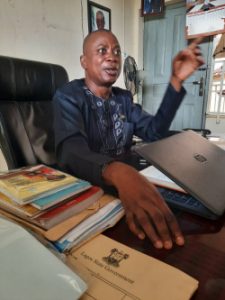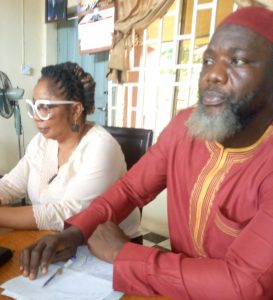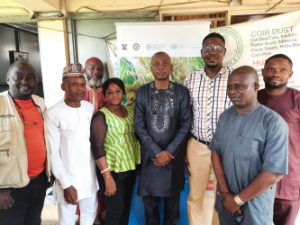The General Manager, Lagos State Coconut Development Agency (LASCODA), Dapo Olakulehin, has asked the Federal and State Governments in Nigeria to pay attention to specific areas with comparative advantage in developing the Nation’s agriculture.
Olakulehin made the call recently, when executives of the Nigerian Association of Agricultural Journalists (NAAJ) paid him a courtesy visit in his office in Lagos.

He underscored the need for Government to redefine its targets in agriculture to fully deploy the potential to the benefit of the economy and the masses.
According to him, ‘In re-defining agriculture, there’s need to move away from blanket recommendation, blanket approach to agriculture to embrace specificity and by specificity we need to look at the areas that have comparative advantage for certain crops.
“That is what happens all over the world. Not that because Anambra is planting oil palm, it is compulsory for Niger state to plant the same. Not that because Borno state is doing well in wheat, Imo state or Oyo state should also go into wheat production.
“So we need to concentrate on areas that we have comparative advantage with specific items and enterprises to each of the locations, if we do that, there would be advantage of economy of scale and we can develop what we call belts.”
The LASCODA boss recommend the establishment of Agriculture belts with specialisation in diverse produce and value chain to fast track development.
“What stops us from having cassava belts and when you get to that belt, you know everything about cassava you’ll see it there. Oil palm belts, cocoa belts, wheat belts, maize belts, and attention will be focused on that.
“I’m not saying farmers in those areas will not cultivate other things for their livelihood but, the attention of government, the resources of the International partners too will also go there so that there will be concentration of effort.
“That is the first way we can deploy the potential of Agriculture for the benefit of the economy. The second one is political will.
“Political will because Agriculture by its very nature is very close to the grassroots where in Nigeria today we still have a lot of subsistence farming.
” If we are still using them, which, off course we cannot push away now to mop up unemployment in the sector, by the time we concentrate and look at it from the value chain point of view, we bring a lot of our youths out of the unemployment market.
“But in doing that, we have to be very strategic, not about establishing industries that will remove hands on, that will remove labor where we should up-scale the processing to certain levels.
“I’m not advocating for industries that will be automated without getting result, I don’t think we are rive for that now, so I’ll rather advise that we develop, we upgrade, we support the small to medium scale industries in agriculture and they are many.
“That is where our strength lies because the small and medium scale industries are practitioners in agriculture, both in processing and production.

“They are major employers of labor. So if the small scale industry is just employing five individuals, can we as a Country move to the situation whereby that particular small scale industry can employ twenty and thirty? They would master the way to do it and to get raw materials.
“The only thing is to expand, so that is another issue. Let us see how we can up-scale the small and medium scale practitioners, support them with production assets and support them with the market.”
Olakulehin emphasized the need to develop agibusiness through capacity building to achieve the nation’s full potentialities in agriculture.
“The third leg is, these days agriculture is a business. We have to look at it that way if we want to really deploy our potential to improve the economy. We need to look at it from a business point of view, most of our small scale practitioners lack capacity in business developing.
“Of course I don’t expect a struggling woman processor who is processing less than a ton of maize to make ‘Ogi’, who is a farmer too by the factor of what she is doing, to go for a training on record keeping or financial management on her own.
“She would feel she doesn’t need such as she’s already managing her business the way she can, and we know that if she has such training, its going to be of help to her so it’s almost on government.
“Apart from giving them inputs and other support, we need to deliberately see how we can build the capacity of our small scale agriculture practitioners. We need to move towards that level.”
Olakulehin also layed emphasis on strengthening linkages within value chains and motivating Farmers for more productivity. “Apart from that, looking at it from a business view, we need to make the linkage robust.
“As it is now, the linkages among the food value chain stakeholders are very weak, I’m talking of the processors, the producers, the transporters, the marketers and even the consumers are very weak.
“Until we get to that level we cannot fully deploy the potentials of agriculture to improve the economy.
“I used to say this; our children at very young ages, as toddlers, when going to school, they cry and you’ll give them sweets, at times you’ll beat them and pacify them. But when you look at it, going to school is going to be to their benefit mainly…
“We the parents will benefit from it also but it is majorly for the child’s own good. Why then are we pacifying them for something that would benefit them? that is the approach I want government to take.

“I’m advocating for government to pacify famers for them to be producing optimally and more productively in terms of giving them more support.
“If we give them support, if we pacify them, if we make them relevant in the scheme of things, definitely, they will help boost the economy and agriculture will naturally deploy it’s potential for the development of the economy in general.”









Comment here